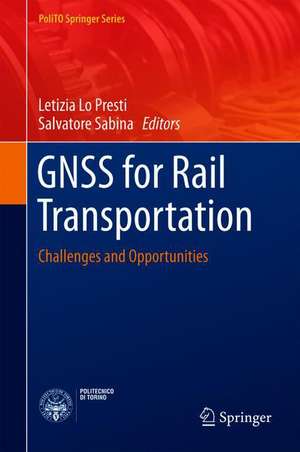GNSS for Rail Transportation: Challenges and Opportunities: PoliTO Springer Series
Editat de Letizia Lo Presti, Salvatore Sabinaen Limba Engleză Hardback – 4 mai 2018
| Toate formatele și edițiile | Preț | Express |
|---|---|---|
| Paperback (1) | 582.12 lei 6-8 săpt. | |
| Springer International Publishing – 29 dec 2018 | 582.12 lei 6-8 săpt. | |
| Hardback (1) | 785.42 lei 6-8 săpt. | |
| Springer International Publishing – 4 mai 2018 | 785.42 lei 6-8 săpt. |
Din seria PoliTO Springer Series
- 15%
 Preț: 638.43 lei
Preț: 638.43 lei - 20%
 Preț: 646.80 lei
Preț: 646.80 lei - 20%
 Preț: 552.17 lei
Preț: 552.17 lei - 20%
 Preț: 545.73 lei
Preț: 545.73 lei - 18%
 Preț: 1119.38 lei
Preț: 1119.38 lei - 23%
 Preț: 607.31 lei
Preț: 607.31 lei - 24%
 Preț: 573.62 lei
Preț: 573.62 lei - 20%
 Preț: 594.72 lei
Preț: 594.72 lei - 15%
 Preț: 640.37 lei
Preț: 640.37 lei - 20%
 Preț: 552.06 lei
Preț: 552.06 lei - 18%
 Preț: 1220.12 lei
Preț: 1220.12 lei - 18%
 Preț: 1001.65 lei
Preț: 1001.65 lei - 18%
 Preț: 718.15 lei
Preț: 718.15 lei -
 Preț: 436.56 lei
Preț: 436.56 lei -
 Preț: 385.84 lei
Preț: 385.84 lei -
 Preț: 383.12 lei
Preț: 383.12 lei - 15%
 Preț: 638.43 lei
Preț: 638.43 lei - 18%
 Preț: 886.62 lei
Preț: 886.62 lei
Preț: 785.42 lei
Preț vechi: 957.83 lei
-18% Nou
Puncte Express: 1178
Preț estimativ în valută:
150.30€ • 156.03$ • 125.33£
150.30€ • 156.03$ • 125.33£
Carte tipărită la comandă
Livrare economică 22 martie-05 aprilie
Preluare comenzi: 021 569.72.76
Specificații
ISBN-13: 9783319790831
ISBN-10: 3319790838
Pagini: 243
Ilustrații: XII, 244 p. 75 illus., 63 illus. in color.
Dimensiuni: 155 x 235 mm
Greutate: 0.54 kg
Ediția:1st ed. 2018
Editura: Springer International Publishing
Colecția Springer
Seria PoliTO Springer Series
Locul publicării:Cham, Switzerland
ISBN-10: 3319790838
Pagini: 243
Ilustrații: XII, 244 p. 75 illus., 63 illus. in color.
Dimensiuni: 155 x 235 mm
Greutate: 0.54 kg
Ediția:1st ed. 2018
Editura: Springer International Publishing
Colecția Springer
Seria PoliTO Springer Series
Locul publicării:Cham, Switzerland
Cuprins
Introduction and book objectives.- Review of common navigation algorithms and measurements errors.- Fundamentals of integrity monitoring.- Fundamentals of integrity monitoring.- Methods for protection level evaluation with augmented-data.- The rail environment: a Challenge for GNSS.- A New Perspective for GNSS Based Safe Train Position.
Notă biografică
Letizia Lo Presti is full professor of Signal Processing and Telecommunication at Politecnico di Torino, Italy. Her research interests focus on signal processing algorithms for satellite navigation. She has been the coordinator of the Master on Navigation and Related Applications (MNRA) of Politecnico di Torino for several years.
Salvatore Sabina is the head of Satellite projects at Ansaldo STS, Genoa, Italy. Ansaldo STS is a leading international company operating in the design, implementation and management of systems and services for signaling and supervision of railway and urban traffic.
Salvatore Sabina is the head of Satellite projects at Ansaldo STS, Genoa, Italy. Ansaldo STS is a leading international company operating in the design, implementation and management of systems and services for signaling and supervision of railway and urban traffic.
Textul de pe ultima copertă
This book proposes a general methodology to introduce Global Navigation Satellite System (GNSS) integrity, starting from a rigorous mathematical description of the problem. It highlights the major issues that designers need to resolve during the development of GNSS-based systems requiring a certain level of confidence on the position estimates. Although it follows a general approach, the final chapters focus on the application of GNSS integrity to rail transportation, as an example. By describing the main requirements in the context of train position function, one of which is the safe function of any train control system, it shows the critical issues associated with the concept of safe position integrity. In particular, one case study clarifies the key differences between the avionic domain and the railway domain related to the application of GNSS technologies, and identifies a number of railway-signaling hazards linked with the use of such technology. Furthermore, it describes various railway-signaling techniques to mitigate such hazards to prepare readers for the future evolution of train control systems, also based on the GNSS technology. This unique book offers a valuable reference guide for engineers and researchers in the fields of satellite navigation and rail transportation.
Caracteristici
Focuses on the application of GNSS integrity to rail transportation Includes examples and case studies of good engineering practice for GNSS technologies and applications Explains the content in a simple way (requires only basic mathematics), with numerous illustrations and examples
